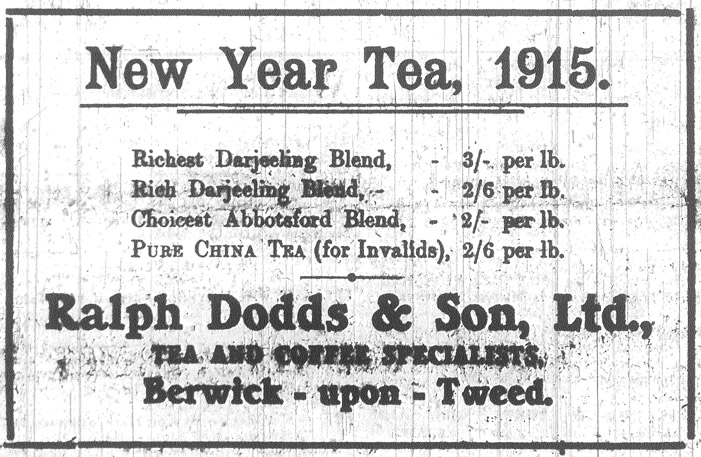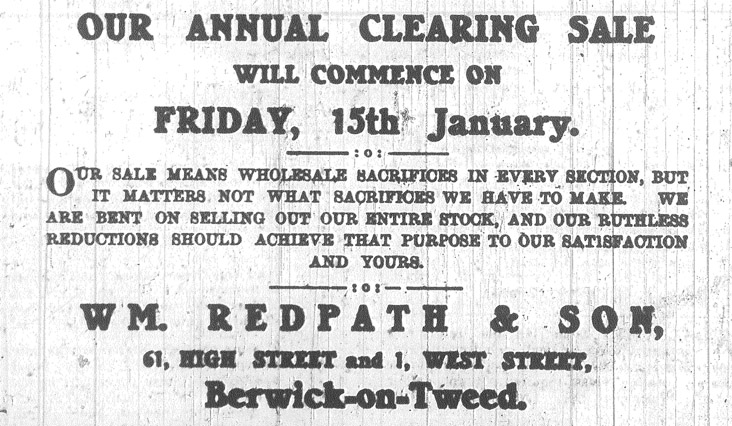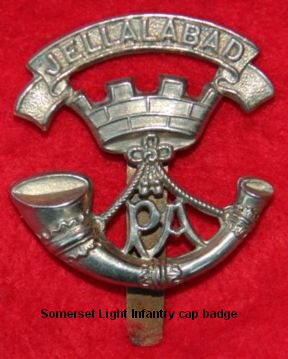8 JANUARY 1915
CHRISTMAS DAY ON THE BATTLEFIELD
————-
SAPPERS INTERESTING LETTER
Mr W Howe, High Street Berwick, has received the following interesting letter from his friend Sapper W. Cromarty, Royal Engineers, who is serving at the front:-
27086
2nd Division Signal Co.
Royal Engineers
Expeditionary Force
30 December
Dear Will: – Well old chap how goes it now? Very many thanks for your kind letter and cigarettes not to mention the good old “Berwick Advertiser” Good gracious what a shock to see my letter in that place of honour, but if I had known you really meant to publish it I should have been a bit more careful in my grammatical expression, etc. However, the Berwick folk are forgiving and I am pretty certain any discrepancy will be passed over lightly.
Christmas 1914, is now a thing of the past, but I must confess that although on active service, I along with my comrades in the detachment managed to enjoy ourselves very much. I started celebrating Christmas on the 24th. On Christmas Eve we had a musical evening. No one was downhearted at all so “King Ragtime” was re-awakened with a vengeance. Ragtime, however, didn’t reign too long. We had solos, some good old fashioned songs (not forgetting the Scotch ones) and last but not least – carols. It was a time of uncertainty, none of us knew how soon we might have to move, but trust the Tommy to make the best of a bad job, or at least I should say making the best use of any opportunity such as we had.
We were determined to have some kind of Christmas celebration and we had it. However, I couldn’t take too much part in the sing song as I had to commence duty at 1 a.m. on Christmas Day, so I had a little sleep before commencing, knowing full well I would stand little chance of getting any when finishing about breakfast time. I started Christmas Day very well indeed, having bacon and eggs for breakfast, the bacon we got supplied, the eggs were procured – from where I cannot say.
After breakfast we all helped to make things as comfortable as possible and then our thoughts turned instinctively to dinner. We then organised what is known to the Tommy out here as a “scrounging” expedition and by the time everyone had returned we found we could manage a very good dinner. Pork chops, potatoes and plenty of vegetables were in our possession and having the means of cooking them alright I can safely say the dinner when finished wouldn’t have caused a murmur from the most severe critic.
Christmas wouldn’t have been complete without a pudding, so I may mention we had Christmas pudding too. We burnt it in the customary way, wished each other compliments of the season and then – exit pudding. I don’t think there was one of us who didn’t feel perfectly happy after dinner. Although our surroundings were none too homely, we felt thankful for being able to get our dinner in peace. Naturally our thoughts were far away at home, wondering how our old folk were faring and doubtless wishing we had been able to fill the vacant chair which could be vividly pictured by the mind’s eye. “Ah well chaps we’ll be home for next Christmas” was one fellow’s consoling remark, to which I heartily said “Roll on”.
I was on duty again after dinner, but was fortunate enough to be present at tea time. What a revelation tea time was! Most of the fellows had had parcels from friends at home, with all manner of good things suitable for tea and so by “mucking in” (another soldiers phrase, we had a real good “bust up” sardines, cakes, scones, butter and bread and jam were all abundantly represented so it does not need an extraordinary intelligent person to understand how much we enjoyed ourselves.

At night we had another concert, which lasted till very late at night and so ended my Christmas Day on the battlefield. It would be unfair not to mention our two officers, who, I am sure, were partly instrumental in lightening our work as much as possible so as to give us a good time. They are both “two of the best” and I consider myself extremely fortunate in having such fine fellows in charge. It is now very close to the New Year, 1914 is closing down its black and warstained pages. Let us hope that 1915 will bring us victory and that very soon we will see the tone of war closed and clasped never to open again.
I was very sorry to hear how our “cultured” friend had visited the East coast and- as is his usual way –taken such a heavy toll of innocent lives. You will have seen many photographs showing the damage caused by the short bombardment of the three towns. You will perhaps be able to grasp some idea as to what a town or village will look like after being bombarded day and night for some time. I have seen villages completely ruined; whilst one town the Germans bombarded very close to where I was working can boast of only a few undamaged buildings. It was a town much larger than Berwick, possessing a beautiful cathedral and some very imposing civil buildings. “Kultur” however, got to work with its big guns and now very little remains but broken jagged walls on the once beautiful buildings. The people at home will now understand and comprehend the martyrdom of the Belgians and French, and I‘m sure instead of having the desired effect of intimidation that act of vandalism will stimulate the people to a sense of duty which will, I am sure, be beneficial to the country.”
Postscript
We are trying to find out additional information about Sapper W Cromarty (27086). We think he survived the First World War and know that he must have had a connection with the North Northumberland area. If anyone can tell us anything else about him, please post a comment or contact berwickarchives@woodhorn.org.uk






